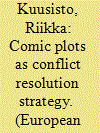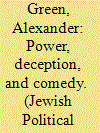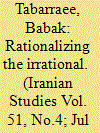| Srl | Item |
| 1 |
ID:
092881


|
|
|
|
|
| Publication |
2009.
|
| Summary/Abstract |
Recently, the 'war stories' of the leaders of the major Western powers - the United States, Britain and France - have adhered to two major plots: the heroic epic or the sad tragedy. The heroic script defines and explains conflicts in which the Western powers have wished to play an active role: the Persian Gulf (1990-1), Kosovo (1999) and the current war against terrorism. The tragic plot has been employed when they have ruled out forceful outside intervention, like in Bosnia (1992-5) and Rwanda (1994). Both scripts are highly problematic conflict resolution approaches: they point to black-and-white, aggressive denouements. An alternative is the comic plot: a story traditionally used in ordinary disagreements among friends, problems with 'small foes' and disputes with important rivals. Adopting a comic framework for most of the conflicts in the world would give the Western leaders more room to negotiate, to try out new ideas and to back down on unsuccessful strategies.
|
|
|
|
|
|
|
|
|
|
|
|
|
|
|
|
| 2 |
ID:
106558


|
|
|
| 3 |
ID:
160288


|
|
|
|
|
| Summary/Abstract |
Reza Attaran is one of the most successful stars of the Iranian popular cinema. This article explores the social circumstances, performative components, and political consequences of Attaran’s popularity and stardom, and the evolution of comedy and satire in the Iranian media after the 1979 Revolution. Analyzing the contextual elements and media texts over the last twenty-five years, the article argues that Attaran actively reflects a complex interaction between the social, political, and artistic demands of each period, best represented through his contribution to the television sketch comedies in the 1990s, and the lowbrow comedies and highbrow absurd films in the 2010s. The trajectory of Attaran’s stardom demonstrates the mechanism by which he serves the maintenance of the status quo.
|
|
|
|
|
|
|
|
|
|
|
|
|
|
|
|